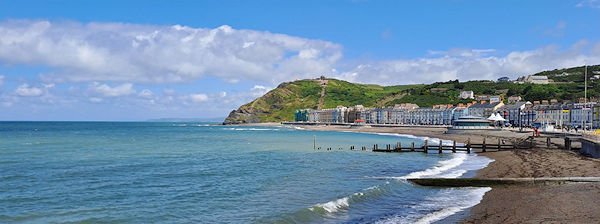

|
Aberystwyth is a lovely town on the west coast of Wales. But it is a fact that it really should not be called Aberystwyth at all! Back in the Dark Ages, when the English had invaded and occupied Wales, a new town was built on the mouth of the river Rheidol. It was the job of the English scrive, working for the new lord of the town, to draw the map of the area and mark in the settlement names. Mishearing, or misunderstanding, the scribe wrote the name of the river as the Ystwyth, and so the town was called Aberystwyth instead of Aberyrheidol. Aberystwyth is in the county Ceredigion and is a university town, the administrative centre of the county, a tourist holiday resort and the centre for the Welsh language. The average population is around 12,000, with 7,000 extra residents during the academic year. "Gown and town" traditionally get along very well. In fact many students never leave, finding jobs and homes in the town. Many of the lecturers are ex-students of the university. Aberystwyth has a pier and promenade, leading up to Constitution Hill, where there is the oldest electric cliff railway in the UK. At the other end of the promenade, past the ruined castle, is a marina. Aberystwyth is the least populated area in the UK, containing hamlets and isolated farmhouses. The nearest large town is several hours journey away. This isolation is one of the reasons why students bond so completely with the town, as it is too far away from anywhere for them to go home at weekends, as students at other universities do.
Main attractions: The castle
In the book "The meaning of Liff" by Douglas Adams and John Lloyd, Aberystwyth is defined as "A nostalgic yearning which is in itself more pleasant than the thing being yearned for". |